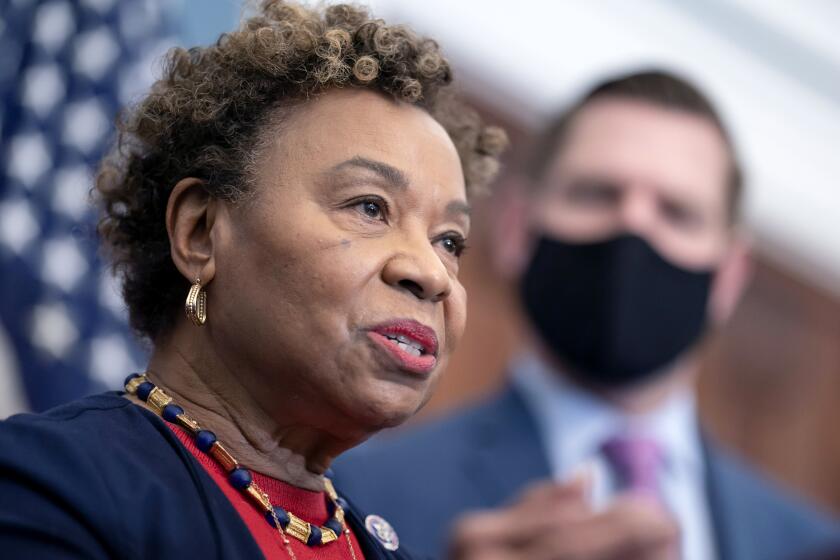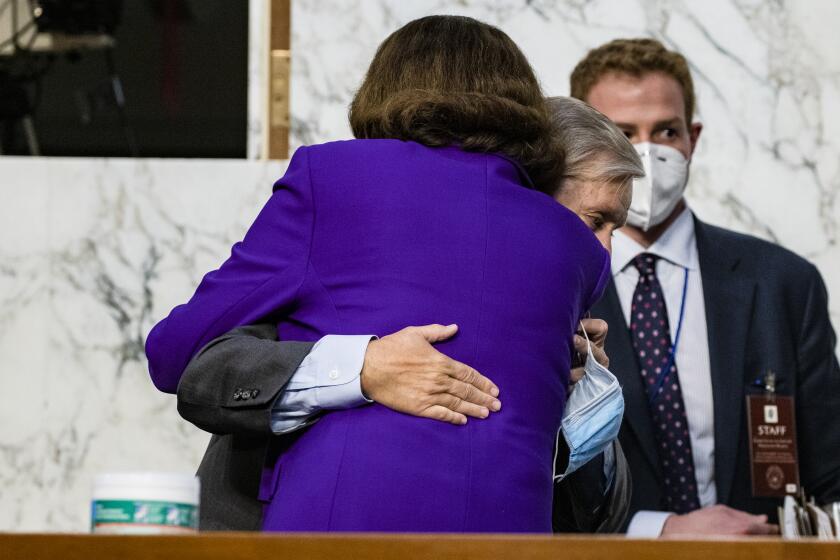Column: Dianne Feinstein breaks new ground, but not in a good way

- Share via
The U.S. Senate was still known as an old men’s club in “The Year of the Woman,” 1992, when the election of California’s Dianne Feinstein and three other Democratic women increased the number of female senators by 200% — to all of six. I covered Congress back then and it was common in those days for there to be at least one aged (male) senator whose enfeeblement was widely whispered about. Yet their colleagues covered for them, making reporting on a senator’s competency pretty difficult.
Three decades and a storied career later, the nearly 90-year-old Feinstein is the Senate’s oldest member, and people are no longer just whispering. Fellow Democrats are publicly calling for her resignation. That makes Feinstein something of a pathbreaker again, though this time not in a good way.
There are several reasons, however, that Feinstein is facing this scrutiny, even if past senators of a certain age — and one current member, Iowa Republican Charles E. Grassley, just reelected in November at 89 — haven’t.
Opinion Columnist
Jackie Calmes
Jackie Calmes brings a critical eye to the national political scene. She has decades of experience covering the White House and Congress.
Alas, her gender is a likely factor, but a relatively small one. Another reason is this: Feinstein represents nearly 40 million people (13 times more than Grassley) in a blue state that’s chock-full of politically ambitious, capable Democrats who covet her seat. Three are already in the 2024 election race to succeed her: Reps. Barbara Lee, Katie Porter and Adam B. Schiff. It was a Lee ally with his own ambitions, Rep. Ro Khanna, who drew headlines Wednesday for tweeting that Feinstein should resign: “It is obvious she can no longer fulfill her duties.”
Even many of her fans had hoped Feinstein wouldn’t run again in 2018; since then, she hasn’t put questions about her capabilities to rest. Like others, I’ve supported Feinstein’s resolve to serve out her six-year term through next year. Now, however, she’s been absent from Washington since February, when she was diagnosed with shingles, and she won’t return Monday when the Senate reconvenes after a spring break.
Which suggests the other big reason Feinstein is drawing unusual attention: She’s missed, badly. With Democrats holding just a 51-49 Senate majority in a divided Congress, and with similarly narrow margins on committees, party members’ full attendance is essential to move their agenda forward.
Sen. Dianne Feinstein’s weeks-long absence from Washington has refocused attention on Gov. Gavin Newsom’s promise to appoint a Black woman if a U.S. Senate seat opens up.
The provocation for the latest publicity was Senate Judiciary Committee Chair Richard J. Durbin’s recent acknowledgements that Feinstein’s absence has stalled Democrats’ push to confirm President Biden’s judicial nominees and provide more balance to a federal bench that was packed with Republican appointees during the Trump years. Without Feinstein, the committee is evenly split, 10 Democrats and 10 Republicans; it last voted on nominees for federal judgeships two months ago.
“I can’t consider nominees in these circumstances,” Durbin said, “because a tie vote is a losing vote in committee.”
Feinstein’s concession to her critics Wednesday — a statement conceding unspecified health “complications” and asking that the Senate name a temporary Democratic replacement for her on the Judiciary panel — is unlikely to assuage those who want her to resign.
In California, Democratic Gov. Gavin Newsom, who’s vowed to name a Black woman if Feinstein does vacate her seat, is probably just as happy to have the senator serve out her term, rather than be forced to pick someone else when a competitive Democratic primary contest is already underway.
Yet he needs to be prepared, perhaps to choose a caretaker who’d warm the seat until the 2024 winner can take it. While Feinstein seems adamant she’s staying on the job, that may not be possible.
California Sen. Dianne Feinstein faces calls to forfeit her senior role on the Judiciary Committee as Democrats slam her performance at Amy Coney Barrett’s hearing.
Back in 2020, Feinstein was pressured to forfeit her place as the Judiciary Committee’s senior Democrat to Durbin, amid partywide outrage that she’d literally embraced then-Judiciary Chairman Lindsey Graham, the South Carolina Republican, after he rammed through Amy Coney Barrett’s nomination to the Supreme Court weeks after Justice Ruth Bader Ginsberg’s death (and just before an election that ultimately would return Senate Democrats to majority power).
That episode was illustrative of Feinstein’s decline in performance and stature. It’s hard to know why some politicians hang on so long; too often it’s sad when they do. Feinstein’s case is one of the saddest, given the cloud that’s now obscuring a proud legacy.
The senator has so many laurels she could have rested upon.
More to Read
Get the latest from Jackie Calmes
Commentary on politics and more from award-winning opinion columnist.
You may occasionally receive promotional content from the Los Angeles Times.














